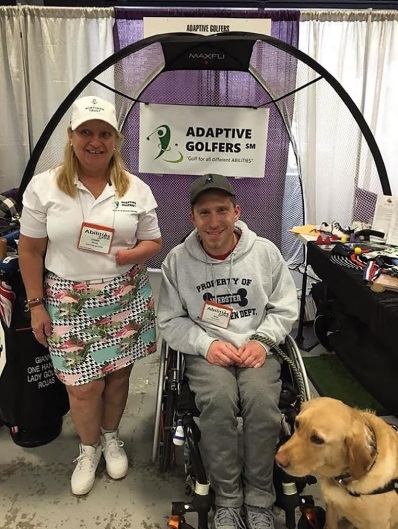I HAVE HAD THE PLEASURE OF MEETING AND TALKING TO GIANNA ROJAS MANY TIMES. GIANNA, THE SELF-PROCLAIMED "ONE-HANDED LADY GOLFER," HAS INSPIRED AND MOTIVATED MANY PEOPLE, WITH AND WITHOUT DISABILITIES.
Faye Simon: Gianna, thank you for sharing your story.
Gianna Rojas: I want to share everything. I don't want to keep it. I can't take it with me. It's not going to do anybody any justice.
FS: Please tell us about yourself.
GR: My mother took a pill called Thalidomide, which was given to pregnant women for morning sickness in the late fifties, early sixties. I was born a year before President Kennedy told all women to get rid of it. If you took the pill, it did its job wonderfully, but it didn't do so well with the fetuses. A lot of the fetuses did not even have a chance. Although there were many babies that were lucky enough to be born, many had internal challenges that they have to deal with, and some were limb deficient. I have both.
People ask me if my siblings have anything. No, they don't. I am the oldest in the family. It was the pill, not something that gets passed down or is genetic. When I found out I was pregnant, I got chromosomal and genetic testing done, to see if I could pass it on, just to know what to expect. Everything was fine. It's not something that can be passed down. There are other reasons for all kinds of things, sure. But that particular pill did wreak havoc.
My dad was in the Navy. Growing up like many other military families, mine moved and changed schools every couple of years – which meant I was regularly the new kid. Like every new kid, I had to build rapport again. The only trouble with being the new kid for me was that I was visibly different. I was born with no fingers on my left hand.
As a child, I had to learn early on how to break the ice with people to make them comfortable with me. As soon as I did, we would move again, and I would have to start all over. I’ve faced more than my fair share of being picked on, left out and bullied. I was even locked in a locker in middle school for three hours until someone finally heard me. Even at the bus stop and at the playground, boys and girls would push me down, my glasses would fall off, and I couldn’t find them.
When I was growing up, there was no term for it. Now we call it "bullying." There was no "anti-bullying" in school when I was a child. Some of the schools I went to were Catholic schools. So, you know, nice in the classroom, not so nice out of the classroom. I
remember even up until the 12th grade, the girls were still pulling my hair and kicking my chair. The same girls would ask me to hang out with them when nobody else was around.
I was consistently thrown around in the cycle: building rapport, moving, getting bullied. We moved up and down the East Coast. We came to NJ when I was in the 9th grade. I stayed in NJ when I was old enough to "jump ship." It is not easy when you're a child and you're that kid that's not getting invited, and is getting picked on, or feels the vibrations of people around you that are uncomfortable. I had a rough childhood, I'll put it that way.
FS: When you were beat up and bullied did anyone help?
GR: Only when it got too far out of hand. I didn't complain a lot or it would get me beat up more.
FS: Did you have friends who stuck up for you when you were bullied?

BEST MEDICINE: Gianna with an Abilities Expo attendee; "Golf has proven to be an incredibly effective medium, and when some level of mastery is achieved, its powerful medicine."
GR: I had "friends" who would only be BEST MEDICINE: Gianna with an Abilities Expo attendee; "Golf has proven to be an incredibly effective medium, and when some level of mastery is achieved, its powerful medicine." my friend when we were not around other people. I had no real girlfriends. I had a first boyfriend who only would be my boyfriend during spring break and not when we went back to school. But I did have a boyfriend in high school that did not mind what everyone else said.
FS: Do you have any advice for kids being bullied and/or parents whose kid is being bullied?
GR: That’s where using a tool, like an activity is helpful. My hope is that I get to talk to that 13-year-old girl, that was me, and find her some way to be able to get out and find something she’s confident in, whether it’s golf, or any other sport. I think sports are the perfect thing, to be able to say, “Not today, bully. I’m going to go play golf. You go pick on somebody else” and not have that be something that leaves a mark on you.
People still teach their children "Don't look, don't stare, don't ask questions. It would be rude." But that makes me invisible and the bias continues, because the questions aren't answered.
I think that it’s so much better for kids now than it was when I was growing up, because it’s not cool to pick on the kid that has challenges anymore. We’re not scapegoats anymore. What I believe is the biggest barrier, and sets up what I consider “conditional bias,” is that we were always taught and people still teach their children “Don’t look, don’t stare, don’t ask questions. It would be rude.” But that makes me invisible and the bias continues, because the questions aren’t answered. I believe the stigma is not out of ill intention. I just think disabilities are misunderstood.